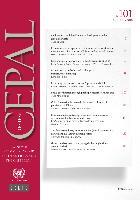Raúl Prebisch and the challenges of development of the XXI century
Economic cycles
The dynamic of capitalist economies is marked by recurrent swings in economic activity and in their different components. Referred to generically as the business cycle, this dynamic has been one of the most fruitful fields and is at the same time one of the most controversial areas in economic and political theory.
Business cycle analysis in Latin America and the Caribbean has long been a central element in the region’s economic research agenda and Raúl Prebisch (1901-1980) is recognized as one of the pioneers in the field. Prebisch’s contribution consisted first and foremost in detecting the high degree of co-movements between the cycle in Latin America and that in the more developed countries. This observation was essential for the development of the centre-periphery concept.
Second, Prebisch noted that the cycle, albeit traditionally considered to be a short-term phenomenon, was intrinsically related to the long term, as pointed out in his manifesto The Economic Development of Latin America and its Principal Problems (1949).
More recent analyses of the business cycle in Latin America, based on the classical cycle methodology corroborate some of Prebisch’s intuitive theories. They demonstrate first of all the high degree of correlation between fluctuations observed in the countries of the region and those observed in the rest of the world.
The analysis of the dynamic of the different phases of the cycle shows that the duration and average intensity of the downswings in Latin America and the Caribbean (both regionally and subregionally) are similar to those in other regions of the world. On the other hand, the expansionary phases are shorter and less intense than elsewhere in the developing world. .
Development in Latin America has been constrained by the difficulties that the region’s economies have had in sustaining the boom periods since they have failed to use these phases to raise the living standards of their peoples. Moreover, low average growth over the past twenty years has weakened their capacity to reverse the effects of recessions on the production structure.
-
Documento completo El ciclo económico en América Latina: Su estilización y efectos en la dinámica productiva Esteban Pérez Caldentey | Daniel Titelman | Pablo Carvallo - CEPAL
Interviews
Esteban Pérez: El impacto actual de los ciclos económicos (2013 - 3:26)
Jan Kregel: Latin American current macroeconomic debates (2013 - 4:29)
Esteban Pérez: Prebisch y los ciclos económicos (2013 - 2:16)
Related documents
-
 Macroeconomy for development: countercyclical policies and production sector transformation
by
Publication Date: 2011-08Revista CEPAL No.104. (LC/G.2498-P)
Macroeconomy for development: countercyclical policies and production sector transformation
by
Publication Date: 2011-08Revista CEPAL No.104. (LC/G.2498-P) -
 El regreso de la crisis en América Latina: algunas experiencias nacionales
by
Publication Date: 2017
El regreso de la crisis en América Latina: algunas experiencias nacionales
by
Publication Date: 2017

